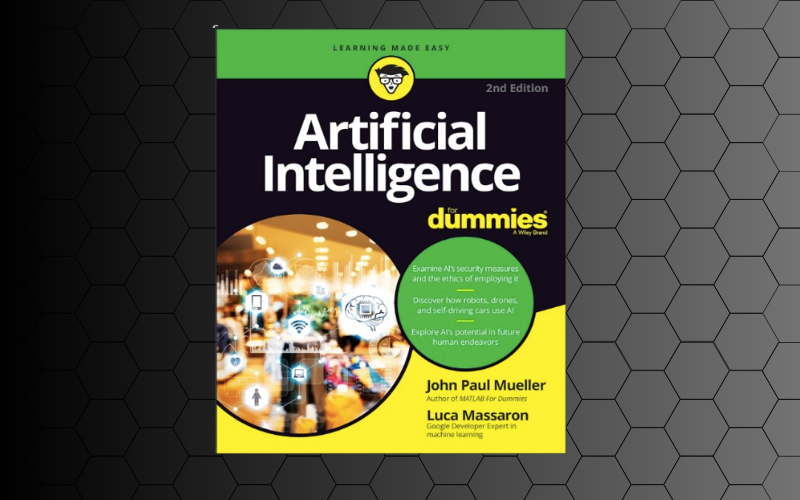Welcome to the essential guide for navigating the world of artificial intelligence: “Artificial Intelligence for Dummies.” Whether you’re a student, professional, or simply a curious mind, this blog post will provide you with a comprehensive overview of the book that demystifies AI. We delve into the authors’ expertise, the purpose behind the book, and the practical applications of AI that are shaping our future. Join us as we unpack the key concepts that make AI an exciting and accessible field for everyone.
For more AI resources visit our ‘Artificial Intelligence HUB’

Authors’ Background

Understanding the authors of “Artificial Intelligence For Dummies” is key to appreciating the depth and accessibility of the knowledge within its pages. John Paul Mueller is a prolific author, having penned over 100 books on topics ranging from computer programming to artificial intelligence. His ability to translate complex technical concepts into language that resonates with everyday readers has made his work a staple in tech education. With a background that marries technical expertise with a knack for clear communication, Mueller has become a trusted voice for those seeking to navigate the often intimidating world of technology.
Luca Massaron is a data scientist and marketing research director with a profound understanding of how artificial intelligence can be leveraged for real-world solutions. His experience in applying AI to solve business challenges ensures that “Artificial Intelligence For Dummies” is not just theoretical but grounded in practical applications. Massaron’s insights provide readers with a glimpse into how AI can be harnessed in various industries, making this book an invaluable resource for professionals and enthusiasts alike.
Together, Mueller and Massaron form a formidable duo. Their combined experience bridges the gap between learning and doing, making “Artificial Intelligence For Dummies by John Paul Mueller and Luca Massaron” an essential read for anyone looking to demystify AI.
Purpose of the Book
The book “Artificial Intelligence for Dummies” stands as a beacon for those intrigued by the potential of AI but feel overwhelmed by its complexity. Its primary purpose is to demystify the fundamentals of artificial intelligence in a manner that is both accessible and engaging. The authors, John Paul Mueller and Luca Massaron, recognize the rapid integration of AI into every aspect of modern life and the resulting imperative for a general understanding of this technology.
A key objective of the book is to provide a comprehensive yet easy-to-follow roadmap for beginners. It delves into the principles of AI, explaining not just the theoretical underpinnings but also offering insights into the practical applications of the technology. Whether it’s understanding how machine learning algorithms work or grasping the intricacies of neural networks, the book ensures that no reader is left behind.
“Artificial Intelligence for Dummies” also aims to equip its audience with the knowledge to make informed decisions about AI and its role in shaping our future. By the end of the book, readers should be able to navigate conversations about AI, understand its implications in various sectors, and perhaps even begin to implement basic AI solutions themselves.
Content Overview
“Artificial Intelligence for Dummies” is structured to gradually build the reader’s understanding of AI, starting from the very basics to more complex concepts. The book begins with an introduction to the history and evolution of AI, setting the stage for a deeper exploration of the subject. It then progresses into the building blocks of AI, including algorithms, machine learning, and data handling, ensuring readers are well-grounded in the essentials.
Subsequent chapters guide the reader through the intricacies of neural networks, deep learning, and cognitive computing. The authors take great care to explain how these components work together to create systems capable of learning, adapting, and making decisions. Practical examples are sprinkled throughout to illustrate how these AI elements are applied in various industries, from healthcare to finance.
The latter parts of the book explore the ethical considerations and future implications of AI, prompting readers to think critically about the role of AI in society. “Artificial Intelligence for Dummies” concludes with a look at how one can begin a career in AI, offering guidance for further learning and development in this exciting field.
Key Concepts Explained
“Artificial Intelligence for Dummies” excels at breaking down the most significant concepts of AI into digestible sections. One of the key concepts addressed is machine learning, where the book elucidates how machines use data to improve their performance over time. The authors tackle different types of machine learning, from supervised and unsupervised to reinforcement learning, clarifying each with real-life examples.
Another cornerstone concept is natural language processing (NLP), which allows machines to understand and interact with human language. The book discusses the complexities of NLP, including sentiment analysis and chatbots, illustrating how these technologies are revolutionizing communication.
Deep learning and neural networks are also pivotal topics covered. “Artificial Intelligence for Dummies” sheds light on how these models mimic the human brain to process data, leading to advancements in image and speech recognition. Additionally, the book doesn’t shy away from explaining the significance of AI ethics and the need for responsible AI development.
Practical Applications
The practical applications of AI are vast and diverse, a theme that “Artificial Intelligence for Dummies” explores with depth and clarity. The book provides readers with a tour of real-world AI applications that influence everything from personal shopping experiences to complex medical diagnoses. For instance, it delves into how AI algorithms power recommendation systems on streaming services, enhancing user experience through personalized content suggestions.
Healthcare is another domain where AI’s impact is meticulously unpacked. The authors describe how machine learning models are being used to predict patient outcomes, assist in diagnostics, and personalize treatment plans. In finance, “Artificial Intelligence for Dummies” illustrates the role of AI in fraud detection and risk management, showcasing how algorithms can analyze patterns and flag irregularities far quicker than human analysts.
Automation and robotics, enriched by AI, are transforming manufacturing and logistics. The book highlights examples such as autonomous vehicles in warehouses and AI-driven quality control systems, which optimize efficiency and accuracy in production lines.
Who Should Read This Book?
“Artificial Intelligence for Dummies” is tailored for a wide audience, reflecting the ubiquitous influence of AI in modern life. It is an ideal starting point for beginners who have little to no background in computer science or AI, as it assumes no prior knowledge and builds up from the basics. Students studying fields where AI is becoming increasingly relevant, such as business, healthcare, or engineering, will find the book particularly useful for gaining an edge in their future careers.
Professionals across various industries can also benefit from understanding AI through this book. For those in leadership or decision-making roles, “Artificial Intelligence for Dummies” offers insights into how AI can be leveraged for strategic advantages and improved efficiencies within their organizations. Entrepreneurs and innovators looking to incorporate AI into their ventures will appreciate the book’s practical applications and ethical considerations sections.
Even tech enthusiasts or hobbyists with a casual interest in AI will find the book engaging and informative, as it provides a clear overview of the field without overwhelming technical detail. Educators and trainers may also use it as a reference to help others understand AI concepts.

Strengths of the Book
“Artificial Intelligence for Dummies” distinguishes itself with several key strengths that make it a standout resource. The book’s primary advantage lies in its clear and jargon-free language, making complex AI topics accessible to readers without specialized knowledge. Its logical structure flows smoothly from fundamental concepts to more intricate topics, ensuring a solid understanding before moving forward.
Another notable strength is the use of real-world examples that connect theory to practice. This not only aids in comprehension but also demonstrates the practical relevance of AI in various industries. The authors’ balanced approach, presenting both the possibilities and challenges of AI, provides a comprehensive view of the field.
The book also excels in providing actionable advice for those looking to apply AI in their work or studies. Whether it’s through step-by-step tutorials or guiding principles for ethical AI use, readers come away with practical knowledge they can implement.
Areas for Improvement
While “Artificial Intelligence for Dummies” is a comprehensive guide for beginners, there are areas where readers might look for further enhancement. For instance, while the book excels at laying the foundation, some may seek more depth on certain advanced topics like machine learning algorithms or AI in blockchain technology. A section dedicated to advanced readers could provide that extra layer of detail.
Another area for potential improvement is the inclusion of more interactive elements, such as online resources or companion websites with interactive examples and exercises. These could offer hands-on experience and a more engaging way to solidify the concepts presented in the book.
In the rapidly evolving field of AI, keeping content up to date is always a challenge. Future editions could benefit from more frequent updates to include the latest AI advancements and case studies, ensuring the book remains a current and authoritative source.
Conclusion and Recommendation
In conclusion, “Artificial Intelligence for Dummies” by John Paul Mueller and Luca Massaron is a commendable resource for anyone looking to unravel the complexities of AI. The book’s ability to distill intricate concepts into understandable language makes it a worthy addition to both the novice’s and the enthusiast’s library. With its comprehensive coverage, practical examples, and ethical discussions, it stands as a solid introductory guide to the field of artificial intelligence.
I wholeheartedly recommend “Artificial Intelligence for Dummies” to those who are just starting their journey into AI, as well as to professionals seeking to understand how AI can be applied in their respective fields. The book’s clear layout, combined with its approachable tone, ensures that readers will not only retain the information but also enjoy the process of learning.
As we wrap up our exploration of “Artificial Intelligence for Dummies,” we invite you, our readers, to engage further with the content and the community. Have you had a chance to read the book? Do you see artificial intelligence playing a role in your professional or personal life? We’re eager to hear your thoughts, experiences, and how the insights from the book have impacted your understanding of AI.
Share how a specific concept from “Artificial Intelligence for Dummies” has clarified your understanding of AI.
Describe any AI project or idea you’re inspired to pursue after reading the book.
Reflect on how AI is shaping your field of work or study. Do you agree with the authors’ perspectives?
We also encourage you to pose questions or topics for debate. Whether you’re curious about ethical considerations in AI, the future of AI in various industries, or how to start a career in AI, let’s start a conversation. Your insights and inquiries enrich our community’s knowledge and foster a collaborative learning environment.

4 responses to “Artificial Intelligence for Dummies – Book Review 2024”
-
When I started reading the book I had very little knowledge about AI. This book grounded me well, and the blog was the right kick start I needed
-
Thankyou Ahmed
-
-
[…] are countless books on AI that cater to beginners and advanced learners alike. Titles like “Artificial Intelligence for Dummies” and “Python Machine Learning” are great starting […]
-
[…] Artificial Intelligence for Dummies ; Python Programming for Beginners […]





Leave a Reply